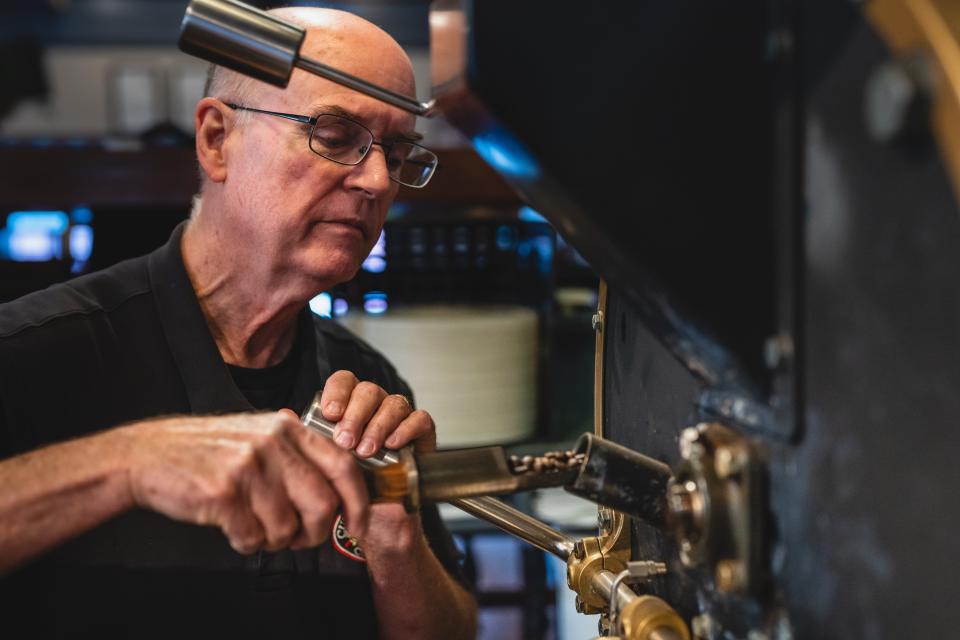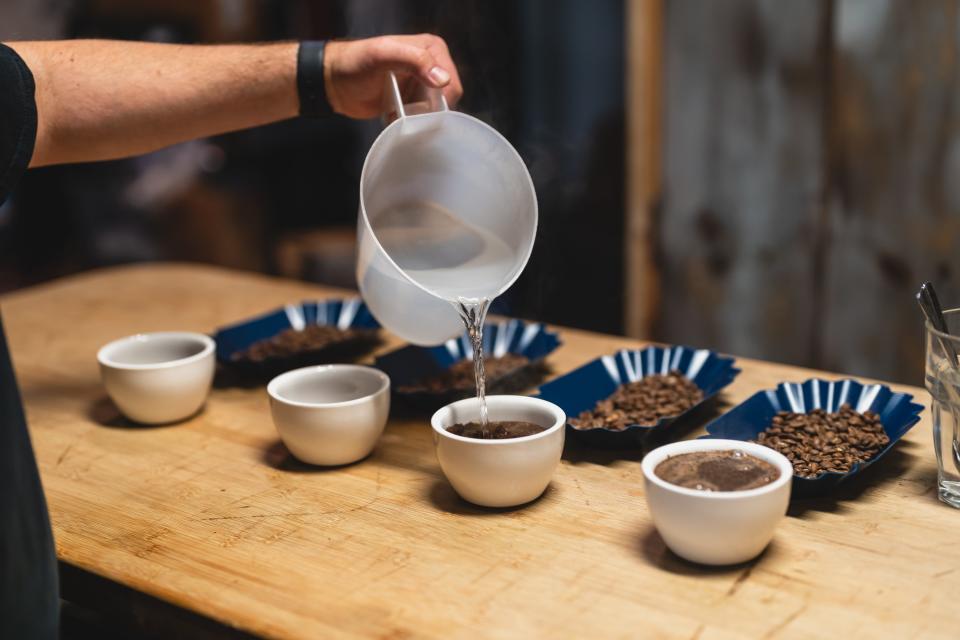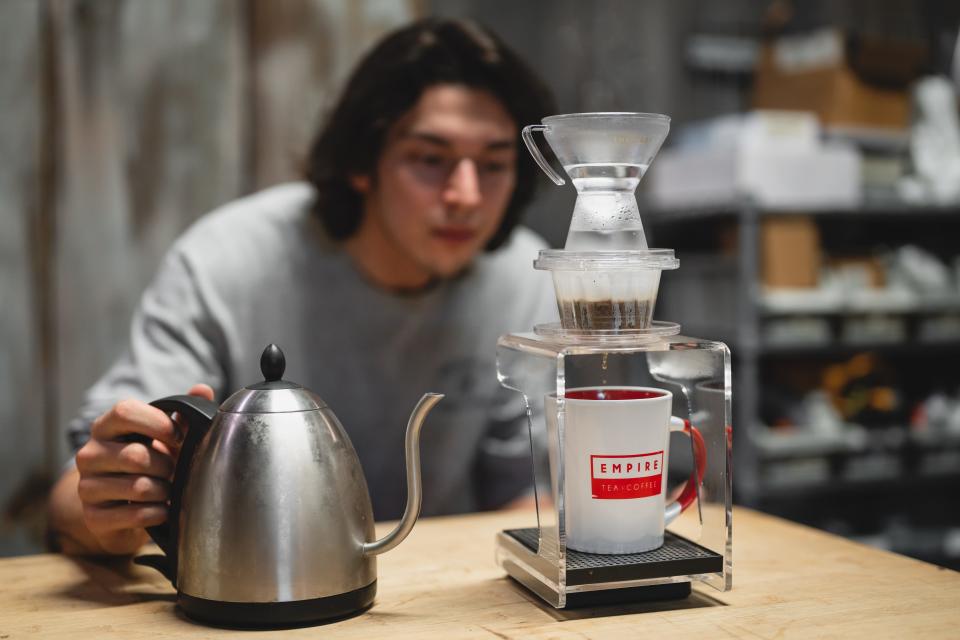Newport County coffee roasters work to brew you a better cup of coffee
Vincent Conte and Ron Marinosci are sipping from small paper cups on the sidewalk patio at Tiverton’s Coastal Roasters (1791 Main Rd, Tiverton). Retired and relaxed as they soak in the early autumn sun, the two meet here most mornings to shoot the breeze and drink coffee. “I come from Warren for this coffee,” says Conte, holding up his cup. “For me, it’s worth the trip.”
“It’s so fresh,” says Marinosci, the more garrulous of the two. “It doesn’t get much better. Plus, I come for the company,” he smiles.

An average of 400 customers visit Coastal Roasters each day, for the company, the view of the Sakonnet River, and some of the freshest, best-tasting coffee around.
“We roast between 45,000 and 50,000 pounds of coffee every year,” says Donald Machado, who owns and operates Coastal with his ex-wife, Lisa. Dressed in a yoga tank top and his trademark flip flops, he exudes the chill vibe of Tiverton’s laid-back style. “I think our customers like to see that what they’re getting is as fresh as it can be. From crop to cup. They see me roasting and they feel good about what they’re buying.”
“Our customers were telling us that there was no good coffee in town and we listened.”
Donald and Lisa opened Coastal back in 2002. They both had corporate backgrounds but were feeling burned out. An opportunity arose to buy the space — a former fish market, among other things — and they jumped on it without thinking. Although Donald had done a little home roasting of his own, “I don’t know what possessed me to think that I could run a coffee business just ’cause I could home roast,” he says. “But I did.”
With Lisa running operations and staffing, Donald devoted his efforts to roasting, sourcing product and absorbing the coffee arts. He learned commercial roasting on the fly and was able to determine — after giving away lots of free cups of coffee — what his customers were looking for. “Initially, I envisioned just roasting coffee for a living. I really wasn’t planning on being a cafe operator,” he says. “But our customers were telling us that there was no good coffee in town and we listened.” By the fall of 2002, the so-called Third Wave of Coffee — a phenomenon referring to the post-Starbucks local cafe scene — had kicked in and Coastal became a fully operating cafe.

While buying high-quality green coffee beans in bulk from trusted sources (largely fair-trade coffee growers) is labor-intensive, controlling the roasting process is more profitable and provides consumers with a gently artisan, bespoke product. And when the roasting is done in-house, it builds a dedicated local clientele, and gives that clientele a special place to invest their time and money — a community sanctuary.
“Roasting gave us a fresh product and total control over the entire process,” Donald says. “We are in touch with the coffee brokers, we do the cupping as well as the roast profiling, and so we know exactly what we’re selling to our customers. People would come in and see me roasting in the back of the store and think it was a novelty. It wasn’t, but my customers got a kick out of it.”
As a roaster, Donald sticks to the basics. Many Third Wave roasters experiment with different approaches to different beans, seeking out exotic coffees with unique flavor profiles. Not Donald. “The science hasn’t evolved over the years,” he says, pushing a few windblown strands of blonde hair off his tanned forehead. “The machinery hasn’t changed, either. There’s not a lot I can do with it. I’m happy not to. I know that there’s more going on in the industry and newer, younger people pushing the roasting process. But I’m fine with the established style that we have, and my customers really like it.”
Over in Middletown, a lovable old dog named Blue pads into Custom House Coffee at 796 Aquidneck Avenue, his owner seeking a fresh cup of coffee. “There he is, there’s Blue!” says one of the baristas. The reception is overwhelming, and the happy dog is soon attended to by a half-dozen members of the Custom House staff.

Bob Mastin, the establishment’s president, general manager and roaster, loves the welcome Blue gets because, he observes, it says a lot about his place and the homey vibe his customers feel when they come in. “We’re like a family here,” he says, literally opening his arms to the scene. “I feel like the father figure, and I’m very grateful for all of them.”
A Navy veteran with a background in both accounting and engineering, Mastin started at home with a simple air roaster and some green coffee beans he purchased online. Now he has a successful business with a staff of 20 and two coffee roasting machines responsible for roasting between 1,000 and 2,000 pounds of beans a week. “I left the Navy knowing I wanted to start this business, and it’s been a real journey ever since,” he says.

The shop’s original machine, a Diedrich IR-12, roasts in 26-pound batches. Their current workhorse (by the same manufacturer) doubles that capacity and requires an afterburner to keep excessive smoke and ash from escaping into the environment. “Back in 2001, when I had just gotten started, I flew out to Idaho to meet with Stephen Diedrich, the guy who designed these roasters,” Mastin says. “He taught me everything I know about running a production like this and roasting great coffee.”
Mastin takes a classic, conservative approach to his roasting. Over the years, he has determined what his customers like — a medium- to dark-roasted coffee — and has served it up, as fresh as possible, to his regular clientele. “You can experiment all you want with flavor profiles,” he says, “but your customers might not like it. I’d rather just focus on giving them the kind of coffee they like to drink.”
More: An entrepreneur leaves his mark on Tiverton Four Corners.
In his two decades of coffee roasting, Mastin has built a steady, successful business with that approach, both retailing and wholesaling his fresh-roasted coffee beans. Forty percent of his roasted beans are wholesaled to clients like Clements’ Marketplace, and both Cru and Belle’s cafes. The operation requires attention to detail — especially trying to keep all of those roasted beans fresh. “Oxygen is the enemy of freshness,”
he says.

Mastin now offloads most of the roasting responsibility to his staff, including his head roaster, Steve Demeter (better known as The Coffee Guy, for his frequent appearances at local farmers markets and festivals). Also helping with roasting are Felicity McDonough, the green coffee buyer, assistant general manager Jessica James, and store manager Kaitlin Welch. Like everything else at Custom House Coffee, roasting is a team effort.
Still, Mastin controls the final product. His roasts, like the roasts at Coastal, are traditional. He doesn’t dabble much in light-roast, as most regular coffee drinkers prefer their beans a little darker. “Medium-roast coffees reach between 400 and 430 degrees Fahrenheit and are typically roasted a little beyond first crack, but not all the way to second crack,” Mastin explains, noting that the “first crack” is a stage where the vapors inside the beans break through the outer wall and create a “cracking” noise.
“That’s the sweet spot,” he says. “But some beans have a different sweet spot. You just have to work a little to find it.”
More: Looking for a new furry friend? This new café in Tiverton lets patrons meet and adopt cats
Over on Broadway in Newport, in the Empire Tea & Coffee nerve center (aka roasting room), it’s business as usual. CJ Barone and Tim Boughton are filling a 32-gallon container with freshly roasted beans. Barone shovels out a handful with a big metal scoop. “This is our light roast,” he says. “There’s no surface oil on the bean.” He walks over to another barrel. “This is our espresso.” The bean is nearly as light, with only a hint of surface oil. And so our discussion about the nuances of roasting coffee beans begins.
More: Eight places you've got to try to get coffee around Newport County
Empire Fills a void in Newport
Barone started Empire in 2004, but the company began roasting its own beans just eight years ago. “There was a void in Newport at the time,” he says. “There were few places offering specialty coffees back then, besides a few competitors and Starbucks.” The cafe started out wholesaling its coffee from Mastin at Custom House Coffee, then diversified their sources. Finally, they invested in roasting machines to gain full control of the process.

“At first, we were roasting some coffee and were doing it really light,” he says. Since Barone and his coworkers don’t take their coffee with cream or sugar, they were very pleased with the results. Unfortunately, their customers, who usually add cream and sugar, didn’t think so. “When you add cream and sugar to a light roast, those things became overpowering, and they told us it tasted like water,” Barone says. “A darker roast, like the coffee at the Custom House, stands up to cream and sugar really well.”
It didn’t take Barone long to recalibrate, and to start roasting for his customers’ tastes. Still, that didn’t pre-vent him from focusing on the lighter side of roasting, but finding the fullest flavor possible. “If you like really dark roasts, we’re definitely not the place for you in general,” he admits. “We tend to be more in the medium to just-past-medium roast range. But even our dark roast is not dark. It’s roasted for a dark profile, so it has a ton of great flavor, but it’s not oily.

“People ask for my advice on coffee all the time,” he adds. “I just tell them, ’However you like it, that’s how you should make it.’”
In the end, however, coffee is only part of the story. “We’re all just here to add a place for you to have a conversation, a great cup of coffee,” Barone says. “Why should we try to move the world in any other way than being a place to come, relax and enjoy getting away from everything else? There’s enough competition in this world. There’s enough to worry about. It can just be about us spending time together.”
This article originally appeared on Newport Daily News: Newport-area coffee roasters work the beans to bring you a better cup

